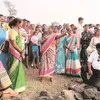This forest officer is enabling villagers in Odisha earn Rs 1 crore every year through eco-tourism
Divisional Forest Officer of Mahanadi Wildlife division Anshu Pragyan Das has made Muduligadia in Odisha self-sustainable by starting an eco-tourism project in the village.
Situated close to the gem-blue waters of the Mahanadi river is Muduligadia — a tiny village in the Nayagarh district of Odisha. Known to be completely self-sustainable and eco-friendly, this hamlet is setting an example for many others in the district.
Divisional Forest Officer of Mahanadi Wildlife division Anshu Pragyan Das, made this possible through her sheer determination and dedication. The eco-tourism project was started in 2018 and served two purposes – helping the locals earn a livelihood, and enhancing forest conservation efforts.

Anshu Pragyan Das, the Divisional Forest Officer of Mahanadi Wildlife Division.
From setting up tents on sand-beds to putting up wall paintings in and around the homes, the initiative brought people together to maintain and develop a way to sustain the model. Besides this, the village has also established an eco-development committee (EDC) with the help of the state forest department.
“The committee from the village approached me, seeking my advice on how to invest in developing their village. That’s when the idea of an eco-village crossed my mind,” Anshu told The Better India.
Today, all 35 households in Muduligadia are using LPG instead of firewood, which in turn, is decreasing air pollution in the area. Anshu and her team also encouraged the residents to spruce up trees, roads, and other public places to welcome tourists who enter the locality. Intending to make the village open defecation free, Anshu supported the villagers in constructing toilets, setting up dustbins, and building better water connectivity.
EDC president Sumanta Das told the New Indian Express that he has observed a marked improvement in the lifestyle of the villagers due to the eco-tourism project.

A glimpse of the houses in Muduligadia.
“The eco-tourism spots began generating considerable revenue for the locals, and they gradually became less dependent on forest products for earning their livelihood. The Odisha model of eco-tourism is the only existing community-based model in India, where over 80 percent of the entire tourism revenue is returned to the community as wages, while the remaining 20 percent is invested for maintenance, upkeep, and up-gradation of the tourist spots,” Anshu explained.
The entire wildlife wing of the forest department led by Anshu has changed the lives of most of the individuals in the village. The project has garnered a revenue of over Rs 1 crore in the last two years, with each household earning around Rs. 15,000 per month.
Do you have an interesting story to share? Please write to us at [email protected]. To stay updated with more positive news, please connect with us on Facebook and Twitter.
Edited by Suman Singh








